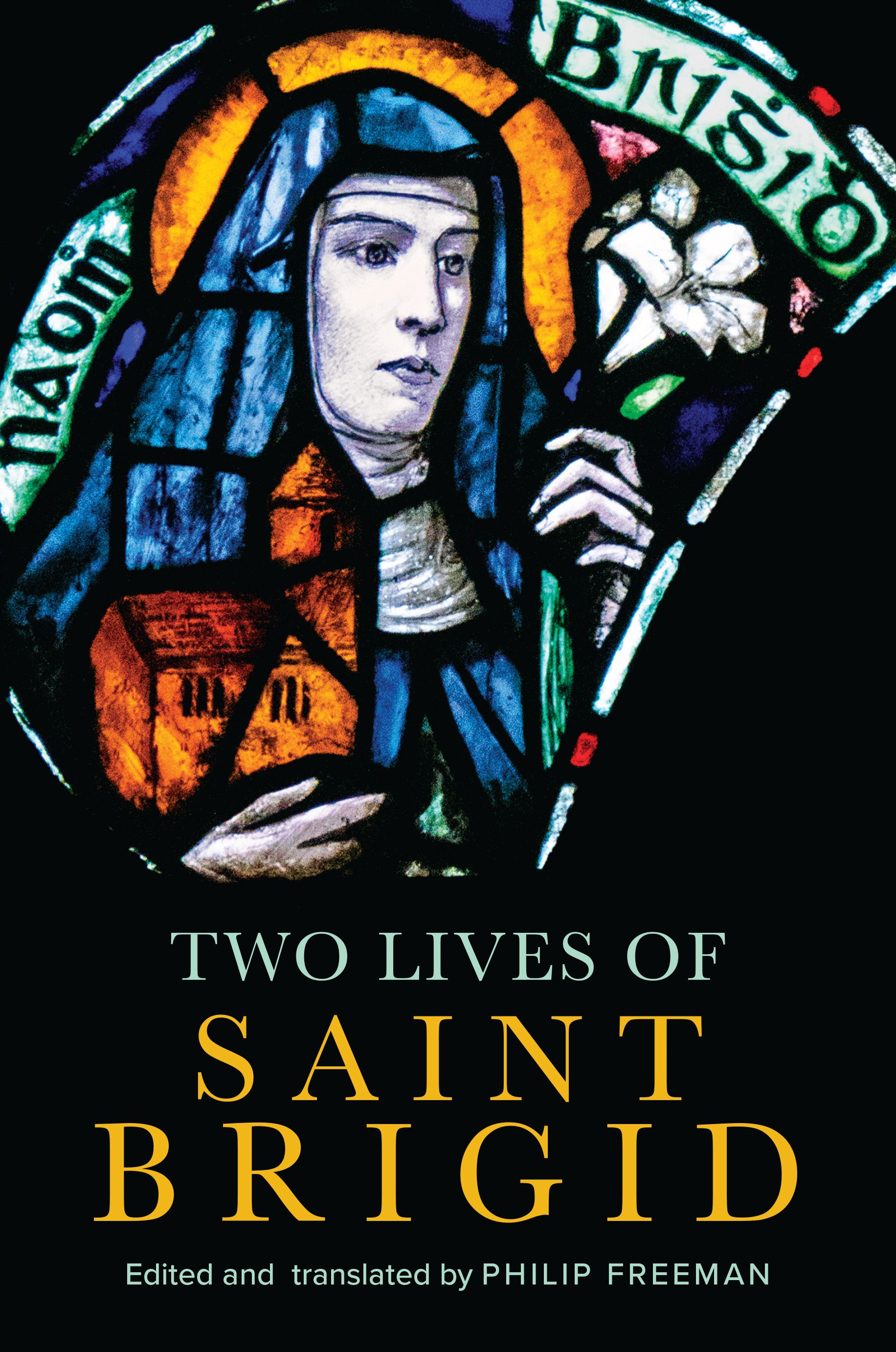Saint Brigid was working in Ireland at a time “when Christianity was a relatively new and foreign religion.” That’s one of the few things, writes author Philip Freeman, that we can say for certain about her. Two more facts: she was born in the middle of the 5th century and she set up a monastery in Kildare on the plains of Leinster, west of Dublin, for men and women. And that’s about it.
However, a great deal has been written about her. Freeman’s latest book, "Two Lives of Saint Brigid," is comprised of translations of the earliest life stories written in Latin – “Life of Saint Brigid” by Cogitosus and the anonymous “Vita Prima.”
“Like most early Christian hagiography, the life of Brigid is portrayed as a series of miracles recorded to prove her devotion to God,” Freeman says.
Brigid’s miracles were mostly based on the Bible, especially the Gospels – for example, she turns water into beer. “But in her miracles Brigid often manipulates nature and communicates with animals in a way uncommon in the Gospels,” he writes.
The goddess of the same name in Irish and wider Celtic religion, he says, was actually a trinity of three goddesses associated with healing, poetry and ironworking. “It was natural and advantageous for Christians establishing a new faith in Ireland to draw on the traditions and stories of native religion as much as possible to ease the transition of new converts. But whether or not such syncretism was deliberate, some aspects of the goddess Brigid are probably present in the stories of the saint.”
It’s not a coincidence the saint’s feast day, Feb. 1, is the same day as Imbolc, a key pre-Christian festival (and both are marked officially, beginning last year, by a public holiday in the Republic of Ireland).
“Even so,” Freeman says, “efforts to present St. Brigid as a thinly-veiled pagan figure from an earlier time – a kind of baptized goddess – are well-meaning but misguided. The Brigid we have from earliest stories and later traditions is an orthodox Christian devoted to good works as a means to serve God and spread the Gospel.”
And they are “wonderful” stories about Ireland’s earliest and best-known female saint, he adds, that provide “a great window into what life was like in Ireland in early medieval times.”
For more about the author, go to his website here.

Philip Freeman
Date of birth: 1961
Place of birth: USA
Children: Two grown children, one a minister and the other a child therapist.
Residence: New Hampshire
Published works: “Two Lives of Saint Brigid” (Four Courts Press, 2024); “Julian: The Last Pagan Emperor of Rome” (Yale University Press, 2023); “How to Tell a Story: An Ancient Guide for Writers and Readers” by Aristotle—introduction and translation (Princeton University Press, 2022); “Hannibal: Rome's Greatest Enemy” (Pegasus Books/Simon & Schuster, 2022); “Celtic Spirituality: An Introduction to the Sacred Wisdom of the Celts” (St. Martin's Press, 2021); “The Rule of Saint Benedict: An Introduction to the Contemplative Life” (St. Martin's Press, 2020); “How to Think About God: An Ancient Guide for Believers and Nonbelievers” by Marcus Cicero—introduction and translation (Princeton University Press, 2019);“How to Be a Friend: An Ancient Guide to True Friendship” by Marcus Cicero—introduction and translation (Princeton University Press, 2018); “Celtic Mythology: Tales of Gods, Goddesses, and Heroes” (Oxford University Press, 2017); “How to Grow Old: Ancient Wisdom for the Second Half of Life” by Marcus Cicero—introduction and translation (Princeton University Press, 2016); “Searching for Sappho: The Lost Songs and World of the First Woman Poet” (W.W. Norton, 2016); “The World of Saint Patrick” (Oxford University Press, 2014); “How to Run a Country: An Ancient Guide for Modern Leaders” by Marcus Cicero—introduction and translation (Princeton University Press, 2013); “How to Win an Election: An Ancient Guide for Modern Politicians” by Quintus Cicero—introduction and translation (Princeton University Press, 2012); “Heroes of Olympus” (children’s edition of “Oh My Gods”) (Simon & Schuster, 2012); “Oh My Gods: A Modern Retelling of Greek and Roman Myths” (Simon & Schuster, 2012); “Alexander the Great” (Simon & Schuster, 2011); “Lecture Notes: A Professor’s Inside Guide to College Success” (Ten Speed/Random House, 2010); “Julius Caesar” (Simon & Schuster, 2008); “The Philosopher and the Druids: A Journey Among the Ancient Celts” (Simon & Schuster, 2006); “Saint Patrick of Ireland: A Biography” (Simon & Schuster, 2004); “War, Women, and Druids: Eyewitness Reports and Early Accounts of the Ancient Celts” (University of Texas Press, 2002); “Ireland and the Classical World” (University of Texas Press, 2001); Editor, “Proceedings of the Harvard Celtic Colloquium 11” (1991). Fiction: “The Gospel of Mary” (Pegasus Books/W.W. Norton, 2017); “Sacrifice” (Pegasus Books/W.W. Norton, 2015); “Saint Brigid’s Bones” (Pegasus Books/W.W. Norton, 2014).
What is your writing routine? Are there ideal conditions?
My favorite way to write is to find a quiet corner of my house surrounded by books and lose myself in writing for a few hours. Though sometimes I get tired of the quiet and find a busy coffee shop to work in.
What advice do you have for aspiring writers?
Write about what you know well and love. Everyone has stories to tell, so if you write from your experience and your heart, people will want to read your story. Also, read a lot of good books yourself.
Name three books that are memorable in terms of your reading pleasure.
“Creation” by Gore Vidal. An amazing work of historical fiction; “The Odyssey”; by Homer, one of the earliest and best adventure stories; “The Hobbit” by JRR Tolkien. A classic about fighting dragons and finding your way home.
What book are you currently reading?
“The Armor of Light” by Ken Follett. The latest in a great series by a fantastic writer.
Is there a book you wish you had written?
There's a really good history of Alexandria, Egypt, that was just published by Islam Issa that I wish I had written—but honestly he did a better job than I could have. A wonderful biography of a city and its people
Name a book that you were pleasantly surprised by.
“The Screwtape Letters” by CS Lewis. A funny and terrifyingly insightful book about a senior demon writing his nephew giving advice on how to lead humans astray. It's a hard book to forget.
If you could meet one author, living or dead, who would it be?
CS Lewis. I love his work and enjoyed touring his house in Oxford a few years ago, even getting to sit at his desk.
What book changed your life?
The two letters of St Patrick that he wrote in the 5th century. They are a revelation about a man so much more than the modern image of Patrick. They are about a man who had terrible struggles, but was determined to do good in life.
What is your favorite spot in Ireland?
Outdoors, Glendalough south of Dublin. Indoors, the National Archaeological Museum in Dublin.







